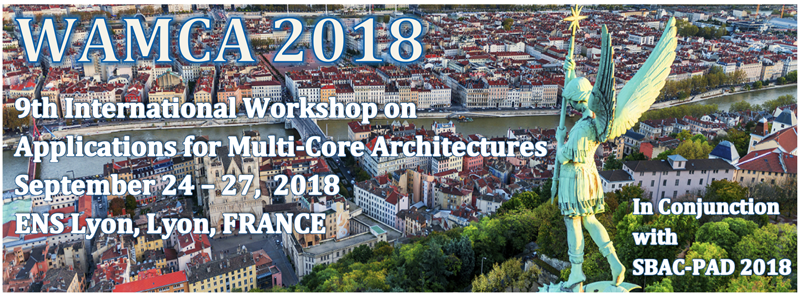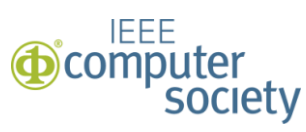


9th Workshop on Applications for Multi-Core Architectures
September 24-27, 2018
ENS Lyon, Lyon, France
Held in conjunction with the
30th International Symposium on Computer Architecture and High Performance Computing
(SBAC-PAD 2018)
Since the advent of the multi-core concept, significant advances have been made on many of the related aspects. Multi-core has become a natural element in the HPC ecosystem, and its pervasiveness within the landscape of common computing devices has made it a standard. Therefore, hardware and software concerns related to multi-core are good targets for computer science investigations, with a high potential for a genuine contribution. Beside the plethora of applications for which more powerful solutions are still expected, efficient implementation techniques for many-core chip processors are of keen interest. WAMCA is aiming at providing an opportunity to address all aforementioned technical challenges and more, including reports on specific case studies. This workshop is an opportunity for application designers and computer architects to discuss new techniques and emerging applications as well as their implications on current and next-generation many-core architectures. Authors are invited to submit manuscripts reporting a technical contribution on multi-core related topics. Aspects of interest include (but are not limited to):
Topics
|
Important Dates
https://easychair.org/conferences/?conf=wamca2018 Contact: claude.tadonki@mines-paristech.fr |
Submissions must be in English, 8 pages maximum, following the IEEE conference formatting guidelines (submission). All accepted papers will be published at IEEE Xplore and selected ones will be considered for a publication in top ranked HPC journal.
|
General Chair Claude Tadonki (MINES ParisTech - PSL) Workshop Chairs Cristiana Bentes (State University of Rio de Janeiro) Gabriele Mencagli (University of Pisa - Italy) Lucia Drummond (Fluminense Federal University) Mauricio Pilla (Federal University of Pelotas) Program Chairs Guido Araujo (State University of Campinas) Phillippe Navaux (Federal University of Rio Grande do Sul) Ricardo Farias (Federal University of Rio de Janeiro) |


|
|
Program Committee Alexandre Gonçalves (IFRJ - Brazil) Andre Rauber Du Bois (UFPEL - Brazil) Corinne Ancourt (Mines ParisTech - France) Costin Iancu (Lawrence Berkeley National Lab - USA) Denis Barthou (INRIA - France) Diego Brandao (CEFET-RJ - Brazil) Diego Dutra (UFRJ - Brazil) Eyder Rios (UESPI - Brazil) Guido Araujo (UNICAMP - Brazil) Guilherme Cox (Rutgers University - US) Henrique Freitas (PUC MG - Brazil) Igor Machado (UERJ - Brazil) Juliana Silva Zamith (UFRRJ - Brazil) Khaled Ibrahim (Lawrence Berkeley National Lab - USA) Konstantin Petrov (INRIA - France) Leandro Marzulo (UERJ - Brazil) Leonel Sousa (INESC-ID - Portugal) Mauricio Pilla (UFPEL - Brazil) Marcelo Zamith (UFRRJ - Brazil) Marcin Paprzycki (IBS PAN and WSM - Poland) Mitsuhisa Sato (RIKEN AICS / University of Tsukuba - Japan) Rodolfo Azevedo (UNICAMP - Brazil) Sandro Rigo (UNICAMP - Brazil) |